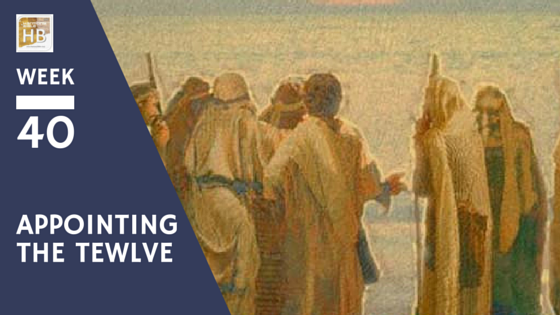Week 40 | Section 52
About thirty months after his baptism, Jesus identifies twelve of his disciples and appoints them to be apostles. The appointment of the twelve apostles occurs immediately as Jesus begins to create a community of disciples and marks our entrance into phase five of Jesus’ Ministry – the missional phase.
Scriptures:
Mark 3:13-19 | Luke 6:12-16
Notes:
- Note that the rate of our study is very close to the rate at which the disciples experienced the ministry of Jesus. The apostles have had about thirty months with Jesus and they will benefit from being able to spend another fifteen months with Jesus before the crucifixion.
- Setting: On the mountain along the Sea of Galilee. Interestingly, except for Judas Iscariot the apostles are from the region, They have all been with Jesus since near the beginning of his ministry (Acts 4:13).
- From among the disciples Jesus is identifying (discerning) apostles from among the crowds of disciples and followers gathered there on the mountainside.
- He prays all night as he makes this decision. In the Greek it is an agonizing prayer. There is a lot resting on this decision.
- The fifth Phase includes five unique seasons to develop a missional lifestyle in the disciple: apprenticeship, training, field work, focus, and multiplication.
- The evidence of what God can do trough these ordinary men, we see the power of God at work among them (and hope of how the Holy Spirit can work through us).
- 2 years from now gospel is spread throughout Judea and Jerusalem (Acts 5-6)
- 4.5 years from now the number of home churches is multiplying rapidly
- 19 years later the Acts 24
- 28 years later its bearing fruit Col 1
- There are other lists of apostles and your group might have reason to explore these. See “Twelve Men Who Changed the World“.
- The word apostle means sent out its meant to establish structural authority (ecclesiastical order). See the Field Guide for Ministry Discernment and Discipleship and note the difference between vocation and spiritual gifts.
- As Jesus’ ministry progresses he enfolds the values of the previous phases (experiential, relational, incarnational, intentional) and also those people in the crowds who are in each phase. He has not isolated himself to those in the upper echelon.
- They expansive ministry of the apostles is incredible and it came at great sacrifice and their constant surrender to the power of God at work in and through them.
Small Group Dialog:
- Revisit the dialog and illustration about the five phases of ministry. Share with one another where you are on the journey and what you sense God is teaching you now (your learning objectives).
- What is a missional lifestyle?
- Thinking about this event consider the basic questions:
- When did Jesus find it important and appropriate to appoint these apostles?
- Why might Jesus have felt the need (importance/priority) to appoint apostles?
- Who did Jesus choose to be apostles? Discuss discernment. See the Field Guide)
- How
- What happened next?
- How might we want to rethink our manner of: formation, ministry discernment, training, commissioning, and the building up of the kingdom of God?
- How might we need to rethink our strategic development of those who take on roles within the local congregation?
- Where or who has God laid on your heart? What resources from God and other disciples do you need to be successful?
